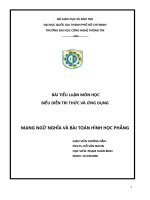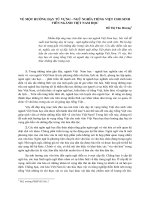En11 từ vựng ngữ nghĩa học bài 21
Bạn đang xem bản rút gọn của tài liệu. Xem và tải ngay bản đầy đủ của tài liệu tại đây (81.13 KB, 5 trang )
<span class="text_page_counter">Trang 1</span><div class="page_container" data-page="1">
<b>HANOI OPEN UNIVERSITYMID -TERM TEST ON LEXICOSEMANTICS</b>
<small>FOR STUDENTS OF ENGLISH (No 1)</small>Subject Code: EN11
Full name:Date of birth:Group:
<b>I. Answer the following questions: (40 points)</b>
<i><b>1. What is a word? its typical features?</b></i>
<b>Answer: </b>
<b>A word is an autonomous linguistic unit possessing both audible and written forms,</b>
capable of forming a coherent sentence independently. It stands as a fundamental building blockof language, with sound and spelling constituting its integral components.
<b>Typical Features of a word</b>
<i>Sound and Spelling Forms: A word has both audible (pronunciation) and written (spelling)</i>
forms. The spoken form represents the sound structure of the word, while the written formsignifies its representation in written language.
<i>Semantic Content: words carry meaning. Each word represents a specific idea, object,</i>
action, or concept. The semantic content of a word is what allows it to convey information andcontribute to the overall meaning of a sentence.
<i>Independence: A word is capable of standing alone and forming a complete unit of</i>
meaning. It can function independently as a standalone entity within a sentence or discourse.
<i>Grammatical Function: Words have grammatical roles within sentences. They can</i>
function as nouns, verbs, adjectives, adverbs, prepositions, conjunctions, and other parts ofspeech, contributing to the syntactic structure of a sentence.
<i>Morphological Structure: Words often consist of morphemes, which are the smallest units</i>
of meaning. Morphemes can be classified as free morphemes, capable of standing alone (e.g.,"book"), or bound morphemes, which need to attach to other morphemes (e.g., the "-ed" in"walked").
<i>Arbitrariness: The relationship between the sound or written form of a word and its</i>
meaning is arbitrary. In most cases, there is no inherent connection between the way a wordsounds or looks and the concept it represents. This characteristic distinguishes linguistic signsfrom non-linguistic signs.
<i>Flexibility and Creativity: Language is dynamic, and words can be combined in various</i>
ways to create new meanings. Speakers have the ability to coin new words or use existing ones innovel ways, showcasing the flexibility and creativity inherent in language.
<i>Cultural and Historical Context: Words often carry cultural and historical connotations.</i>
Their usage and meanings can evolve over time, reflecting changes in society, technology, orcultural norms.
<i><b>2. What is a morpheme? What are the differences between a word and a morpheme?</b></i>
<b>Anwer:</b>
</div><span class="text_page_counter">Trang 2</span><div class="page_container" data-page="2"><i> Content Words: These are free morphemes that can stand alone as independent</i>
words, encompassing nouns, verbs, prepositions, adjectives, and adverbs. Examplesinclude "manage," "mother," "pen," and "tea." This category, referred to as lexicalcontent words, constitutes an open class, allowing for the incorporation of newwords over time.
<i> Function Words: Also falling under free morphemes, function words are part of a</i>
closed class, where no new words can be added. They include articles (e.g., "the,""a"), pronouns (e.g., "I," "you"), conjunctions (e.g., "but," "if"), and demonstratives(e.g., "these," "that"). Function words primarily serve structural roles, indicatinggrammatical relations.
<small></small> <b>Bound Morphemes:</b>
Bound morphemes differ from free morphemes as they cannot exist independentlybut rather attach to other morphemes. Examples include "-ment" in "management"and "un-" in "unhappy." These morphemes contribute to the overall meaning of aword but require attachment to free morphemes for coherence.
<b>The differences between a word and a morpheme</b>
<b>Definition</b> A standalone unit with bothaudible and written forms,capable of conveying meaningindependently.
The smallest unit of meaning inlanguage, which can be independent(free morpheme) or dependent (boundmorpheme).
<b>Independence</b> Capable of standing alone
within a sentence or discourse. <sup>May be independent (free morpheme)</sup>or dependent (bound morpheme),requiring attachment to conveycomplete meaning.
<b>Meaning</b> Represents specific concepts,
objects, actions, or ideas. <sup>Carries meaning but may not convey</sup>complete meanings on its own,especially for bound morphemes.
<b>Examples</b> "Book," "run," "happy" arestandalone words with completemeanings.
In "unhappiness," "un-" is a boundmorpheme contributing to themeaning of the base word"happiness."
<b>Roles</b> <sup>Function as different parts of</sup>speech (nouns, verbs,adjectives, etc.) within asentence.
Play grammatical roles but may notfunction as standalone words,especially for bound morphemes.
<b>Arbitrariness</b> The relationship between theform of the word and itsmeaning is arbitrary.
Similar arbitrariness exists in therelationship between the form of amorpheme and its meaning, especiallyfor bound morphemes.
</div><span class="text_page_counter">Trang 3</span><div class="page_container" data-page="3"><b>II. Exercises </b>
<b>Exercises on Prefixes</b>
<b>I.Which negative adjective fits each of the following definition?</b>
1. <b>Single not having a husband or wife.</b>
2. <b>Inedible means impossible to eat</b>
3. <b>Illiterate means unable to read and write.</b>
4. <b>Unemployed means not having a job.</b>
5. <b>Impartial means fair in giving judgement, not favouring one side.</b>
6. <b>Irreplaceable means unable to be replaced.II. Answer the following questions</b>
1. What kind of oven cooks things particularly fast?Microwave oven
2. What kind of drug can help somebody with an infection?Antibiotics
3. What kind of company has branches in many countries? A multinational company.
4. How does a passenger aeroplane normally fly?
By using its engines to generate lift and thrust, allowing it to travel through the air.5. What is a student who is studying for a second degree?
A postgraduate student or a graduate student pursuing a second degree.
6. What means "underground railway in the US " and " underground passage in the UK"? In the US, "underground railway" typically refers to a subway or metro system. In the UK, "underground passage" generally refers to a pedestrian subway or underpass.
<b>III.Rewrite the following sentences, using prefixes.</b>
1. He's in favour of the American approach . He's pro-American approach.
2. The BBC tried to avoid pronouncing foreign words incorrectly The BBC attempted to mispronounce foreign words.
3. Most people say they have to work too hard but are paid too little
</div><span class="text_page_counter">Trang 4</span><div class="page_container" data-page="4">4 She's still in good relationship with her ex-husband.
6. He made so many mistakes in the letter that he had to write it again He made so many mistakes in the letter that he had to rewrite it.
</div><span class="text_page_counter">Trang 5</span><div class="page_container" data-page="5"><b>IV. Use your knowledge of prefixes to write definitions of the underlined words</b>
Although Jim is an ex-soldier, he's only semi-literate. When he tries to write a letter, he misspells half the words and his wife has to rewrite it for him. His wife used to work in a sub-department of the post office where her main job was redirecting mail. Jim's very pro-army but he over-emphasizes its good points. His wife, on the other hand, is rather anti-army and she undervalues its positive aspects.
Although Jim used to be a soldier, he’s only patty literate/ half-literate. When he triesto write a letter, he spells half the words incorrectly and his wife has to write it again forhim. His wife used to work in a not very important department of the post office where hermain job was forwarding mail to new addresses. Jim’s very much in favour of the army buthe gives too much emphasis to its good points. His wife, on the other hand, is rather againstthe army and she doesn’t give enough value to its positive aspects.
<b>V. Which word is the odd one out in each set and why?</b>
1. egible, loyal, legal, legitimate. <b>egible, because "egible" is not a valid English word.</b>
The other words ('loyal,' 'legal,' 'legitimate') are all common English words with clearmeanings, while "egible" appears to be a non-existent term.
2. insert, internal, inedible, income. <b>inedible, because "inedible" stands out as it refers</b>
to something that cannot be eaten, while the other words relate to aspects likeplacement ('insert'), location ('internal'), and financial gain ('income').
<b>3. uncomfortable, unlock, unfold, unzip. uncomfortable, because it describes a state</b>
of discomfort or unease, while the other words ('unlock,' 'unfold,' 'unzip') all involvethe action of opening or releasing.
4. extract, ex-wife, ex- communicative, exhale. <b>ex-communicative, because it seems</b>
to be a less common or invented term. The other words ('extract,' 'ex-wife,' 'exhale')are established words with clear meanings.
<b>5. worship, kinship, friendship, partnership worship, because the remaining words</b>
('kinship,' 'friendship', 'partnership') all describe various forms of interpersonalconnections, while "worship" denotes reverence or devotion to a deity or entity.
</div>








